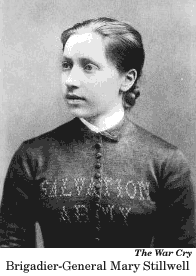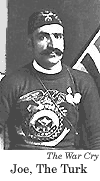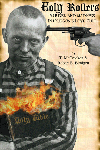-
The Salvation Army Opening Fire in Portland, OR in 1886 - Step one in starting a church:
Convince someone God exists. Easier, capture the
attention of someone who already believes God exists.
Better yet, capture the attention of a whole lot of
people who already believe God exists. That's what Franz
Edmund Creffield did. In 1902 he captured the attention
almost all of Corvallis, Oregon's garrison of Salvation
Soldiers and lured them to his church.
Those not in his church, summed up their of opinions of Creffield and his creed by tapping a finger on their foreheads. That was a better reaction than the Salvation Army received when they "opened fire" in Portland sixteen years earlier.
-
-
Morning Oregonian September 30, 1934 -
________ -
ROCKS, EGGS AND BLOODSHED EARLY SALVATION FARE HERE -
________ -
Struggles of Army to Establish Work in Portland One of Stirring Chapters in Organization's History. -
by -
Joseph MacQueen -
________  When
the neighborhood of Fourth and Burnside was both a
residential and business section the first services of
the Salvation Army in this region were held October 3,
1886, in an old frame structure at 92 B Street, now known
as Burnside, between Fourth and fifth avenues, according
to The Oregonian of October 17 that year, and also
the present Portland commanders of the Salvation Army
unit, Major and Mrs. C. O. Taylor, who came here from San
Diego, Cal.
When
the neighborhood of Fourth and Burnside was both a
residential and business section the first services of
the Salvation Army in this region were held October 3,
1886, in an old frame structure at 92 B Street, now known
as Burnside, between Fourth and fifth avenues, according
to The Oregonian of October 17 that year, and also
the present Portland commanders of the Salvation Army
unit, Major and Mrs. C. O. Taylor, who came here from San
Diego, Cal.
A religious worker named Robinson, and employed here as a laborer, determined that the north end of this city, and especially its sailor population, required the ministry work of the Salvation Army, and he wrote voicing his entreaty to Captain Levins, stationed in San Francisco. Mrs. Stillwell came here and took charge of the work, assisted by Cadets Bernhardt and Whittaker.
When street parades began to be held here, street loungers greeted the Salvation workers with hostility and bad language and threw rocks and eggs.
An east side branch of the army was roughly treated for having broken the city ordinance which at that time forbade religious meetings in the streets and street parades without first having secured city permits.
-
Blood was Shed. - Salvationists were repeatedly cast into jail both in Portland and on the east side, and one east side justice of the peace was quite incensed at the army, so much so that he handed out severe jail sentences and rebukes from the bench because of what he called lawlessness. One Salvation Army worker in the crude east side jail painted salvation texts on the grimy walls, and the east side justice so far repented his actions and language that soon afterward he became a member of the army.
- The early Salvation Army hall on the west side had room for about 400 persons and had sawdust on the floor, says an account left by Captain R. Stubbs. a reporter of the Oregonian of those days wrote that he attended a service of the "band of itinerant religious enthusiasts known as the Salvation Army" at first and Washington streets and heard the Salvationists sing the hymns "I've Been a Bad Boy; I'll Be so No More" and "We'll Battle for God or We'll Die."
- Sailor boarding-house proprietors
around 1886-87 disliked the army because so many sailors
became converted and hurt their business. One of these
bosses told an Oregonian reporter in October 1886:
"We either have to give up our sailor houses or join the
Salvation Army. If we don't we are ruined."
 Gradually
public hostility against the army died down. Another and
later army headquarters station was opened at Tenth and
Taylor streets. Today the up-to-date Salvation Army
citadel at 527 southwest Ankeny street and Sixth avenue
cost about $60,000. Expenses connected with it are partly
paid for by tithes of its congregation and public
offerings. It is only partly paid for and additional
funds are required.
Gradually
public hostility against the army died down. Another and
later army headquarters station was opened at Tenth and
Taylor streets. Today the up-to-date Salvation Army
citadel at 527 southwest Ankeny street and Sixth avenue
cost about $60,000. Expenses connected with it are partly
paid for by tithes of its congregation and public
offerings. It is only partly paid for and additional
funds are required. - William Booth, called General Booth and father of the Salvation Army was born in England in 1865 and died in 1912.
-
***
-
-
Even after gaining respectability, the Salvation Army was not immune to public hostility. -
Corvallis Times January 7, 1897 -
A PIECE OF HOODLUMISM - While the Salvation army was busied with the usual nightly parade on Main street, the other night, some unknown person emptied on the floor of the barracks the contents of a bottle of skunk musk. The musk is supposed to be the same that Barber Case bought of a country lad, mention of which transaction was made in the TIMES last issue.
- When the army with its congregation arrived at their headquarters to proceed with the usual nightly meeting, the stench inside the room was so vile that few people cared to brave it, even in the hope of securing salvation free. The odor, it is said, even hangs about and haunts the place to this day, in spite of the fact that every effort was made to remove it.
-
*** -
- By the early 1900s the Salvation Army had about twenty-five soldiers in Corvallis and ran regular announcements in the city's papers trying to lure people to their meetings by promising something more lurid than a sermon on Salvation.
-
Corvallis Gazette January 5, 1900 - Unearthed! Exposed! Made public! Terrible tragedy! Full details! Names given! A blood stained bag! Ghastly contents to be exposed Saturday night 8 o'clock at the Salvation Army hall, January 6th. Full particulars of the greatest crime ever made public. All are welcome.
-
 Corvallis
Gazette May 5,
1901
Corvallis
Gazette May 5,
1901
- There is to be a stereopticon entertainment at the Salvation Army hall next Tuesday evening. Views of the Galveston horror will be shown with explanatory notes by Chief Divisional Officer J. W. Cousins; also illustrated songs by Adjt. Smith of Portland. Major Harris will conduct services tomorrow and Sunday at the usual hours.
-
Corvallis Gazette June 20, 1902 - Joe, the Turk, is to be the attraction at the Salvation Army Hall tonight. He has an international reputation, having traveled through England, France, Greece and all over the United States. He wears a full Turkish costume, and plays the coronet, clarinet and saxophone. He will exhibit some photographs of the Armenian massacres.
-
*** -
And then Edmund Creffield came to town. -
Reverend Knapp's Bible Songs of Salvation & Victory
(songs sung by the Holy Rollers)
Holiness vs Holy Roller Theology
The Salvation Army Opens Fire in Portland in 1886
A Wedding Salvation Army Style in 1904
A few Articles About The Salvation Army in Corvallis in 1903
Lots of Articles from the Corvallis Gazette & Corvallis Times from 1897 to 1903 about the Salvation Army the latter of which had a regular feature titled, Local Lore, News Of Corvallis and Vicinity Told in Brief, The comings and Goings of People, Social Gossip, Personal Mention and Other Items of Public Interest.
***
Newspaper Articles about Creffield & the Holy Rollers
1897-1903: B.C. (Before Creffield)
October to December 1903:Holy Rollers Burn Furniture & Pets
January to March, 1904: Holy Rollers Tarred and Feathered
April to June 1904: Holy Rollers are Committed to the Asylum
July 1904: Creffield is Found & Arrested
September 1904: Creffield's Trial
April 1906: Men are Gunning For Creffield
May 1906: Creffield is Murdered, Murderer is Considered a Hero
May 1906: Holy Rollers Found Starving Near Heceta Head
June 1906: George Mitchell's Trial Begins
July 1906: Hurt Testifies of Debauched Wife and Debased Sisters
July 1906: Esther Mitchell Kills Her Brother
August to October 1906: Seattle Prepares for another Big Trial
November 1906: Maud Hurt Creffield Commits Suicide
April 1909-August 1914: Esther Leaves the Asylum
1953 Stewart Holbrook's Murder Without Tears
1951Startling Detective Magazine, Nemesis of the Nudist High Priest
***
Chapters from
Holy Rollers: Murder & Madness in Oregon's Love Cult
Part 1: The Seduction
Chapter 1: Trust Me, Brothers And Sisters
(Life Before Creffield [B.C.])
Chapter 2: God, Save Us From Compromising Preachers
(Creffield's Preachings)
Chapter 3: The Flock
(Profiles of the Holy Rollers Were)
Chapter 4: The Holy Rollers
(Things Start to Get Wild on on Kiger Island)
Chapter 5: Housecleaning
(There's a Sacrificial Bonfire)
Chapter 6: Community Concerns
(Officers Visit)
Chapter 7: Esther, The Chosen One
(Creffield Plans to Marry 16-Year- Old)
Chapter 8: Tar and Feathers
(The Men of Corvallis Act)
Chapter 9: Sane People Don’t Go Bareheaded
(Holy Rollers are Committed to the Asylum)
Chapter 10: More Beast Than Man
( Creffield is Arrested)
Chapter 11: God Will Plead Creffield's Case
(Creffield in Court)
Chapter 12: Scandal
(Shocking Testimony at the Trial)
Chapter 13: Calm Before the Storm
(The Holy Rollers Resume their Lives)
Chapter 14: Giving Up The Ghost
(Men are Gunning for Creffield)
Part Two: The People V. Creffield
Chapter 16: The Widow Creffield
Chapter 19: An Inherited Streak of Insanity
Part Three: The Madness
Chapter 23: Seeking Reconciliation
Chapter 24: Another Holy Roller Page One Murder
Chapter 25: What Can Papa Do For You?
Chapter 26: Human Life is Too Cheap In This Community
Chapter 30: The Final Chapter
(What Happened to Everyone Afterwards)
The Epilogue
(Heaven's Gate)
